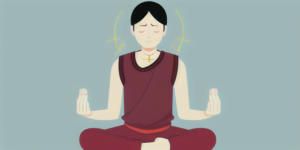Picture a whirlpool in a vast ocean – an entity constantly revolving, drawing everything into its swirl. Our minds are akin to this whirlpool, especially when it comes to the unconscious cyclical impulses that dictate our lives. With stress, desires, and conditioning acting as currents, we often find ourselves spinning in circles. In this article, we’ll delve into familiar scenarios that illuminate the cyclical nature of our impulses and ways to chart a course out of these relentless currents.
The Tidal Waves of Work-Life:
- The Sisyphean Loop:
Consider the ancient Greek myth of Sisyphus, cursed to eternally roll a boulder uphill, only to watch it roll back down. This mirrors our own relentless cycles of work and stress. We exert ourselves at work to earn money and alleviate financial stress, but this very effort begets mental and emotional stress. To cope, we seek refuge in desires and comforts.
- The Retail Therapy Paradox:
Imagine a parched traveler finding an oasis but drinking so much that they feel bloated and slow. This is akin to ‘Retail Therapy’. The mental stress drives us to indulge in shopping to seek solace. However, the excess spending drains the resources we worked so hard to acquire. This, in turn, creates anxiety about finances, pushing us back into the whirlpool of work and spending.
- The Comfort Food Carousel:
Think of our minds as being on a carousel, seeking comfort from a myriad of foods as it turns. When stressed, we tend to gravitate towards comfort foods. However, the momentary solace they provide leads to a loop where the mind craves for more every time it experiences stress.
- The Clockwork of Escapism:
Escapism is like a pendulum clock; the more the stress pulls us in one direction, the more we swing towards escape mechanisms like alcohol, binge-watching, or other distractions. This cyclical motion becomes an automatic response to stress.
Anchoring The Mind:
Breaking free from this whirlpool necessitates an anchor that can steady the mind. Here are a few strategies:
- Mindfulness: The Compass:
Just as a compass shows the direction, mindfulness helps us see our cyclical patterns clearly. When we are conscious of the loop, we have the power to alter the course.
- Budgeting: The Lifebuoy:
Financial anxiety often plays a pivotal role in these cycles. Keeping a budget acts like a lifebuoy that keeps us afloat, preventing us from drowning in impulsive spending.
- Alternative Stress Relievers: The Oars:
Finding alternative means to combat stress, such as exercise, hobbies, or spending time with loved ones, can be like using oars to row our boat out of the whirlpool.
- Counseling: The Lighthouse:
Sometimes, we need an external guiding light to show us the way. Counseling and therapy can provide insights and coping strategies that can help steer clear of these cyclical traps.
Our minds are powerful entities, often akin to the natural forces of oceans and whirlpools. Understanding the cyclical impulses that steer our course is vital in navigating the stormy waters of life. Through mindfulness, budgeting, alternative stress relievers, and counseling, we can anchor ourselves and set sail towards calmer seas.





